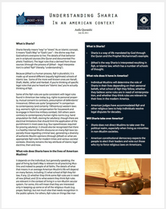
Understanding Sharia in an American Context
WHAT IS SHARIA?
Sharia literally means “way” or “street.” As an Islamic concept, it means “God’s Way” or “God’s Law” – the divine way that God exhorts everyone to live. The details of that behavior are in scriptural sources (the Quran and documented Prophetic Tradition). The legal rules that a derived from those sources (through the process of ijtihad – legal interpretation) is called “fiqh” (literally, “understanding”).
Because ijtihad is a human process, fiqh is pluralistic; it is made up of several different (equally legitimate) schools of Islamic law. Some of the more well-known ones are Hanafi, Shafii, Maliki, Ja’fari and Hanbali. If you’re thinking of specific legal rules that you’ve heard are “Islamic law,” you’re actually thinking of fiqh.
Some of the fiqh rules are quite consistent with legal rules found in American law today (e.g. rights to personal property, mutual consent to contracts, presumption of defendants’ innocence). Others are quite “progressive” in comparison to contemporary (and certainly 19thcentury) western laws (e.g. women’s right to compensation for housework and to engage in front-line military combat). Still others seem contrary to contemporary human rights norms (e.g. hand amputation for theft, stoning for adultery), though there are doctrinal limitations that should limit the application of the punishment in most cases (e.g. four eyewitnesses required for proving adultery). It should also be recognized that there is a healthy internal Muslim discourse on many fiqh laws (especially those regarding criminal law), generating a diversity of authentic Muslim opinions (through ijtihad) on what are appropriate fiqh rules for modern times and various societal contexts. Diversity remains the key attribute of Islamic legal doctrine, then and now.


